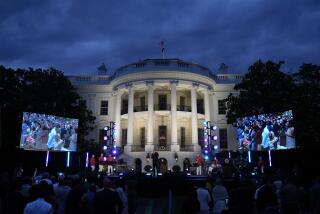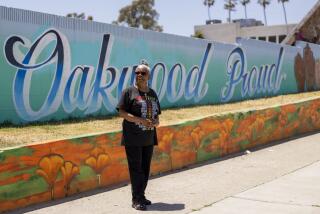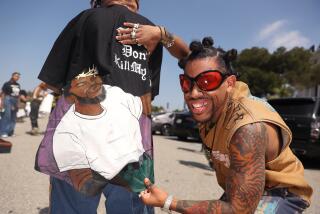Juneteenth Celebrations Grow in Significance
- Share via
That first celebration must have been joy in its purest form, so pure it traveled down through generations, until it reached those who had no memory of slavery; a joy shared with descendants, making sure they would always remember the moment their ancestors were freed.
For those celebrating Juneteenth--the holiday marking the day when enslaved Africans in Texas learned they were free--the day is also becoming a time to reflect on what is needed for progress to continue. Rather than dimming, after 135 years the day has taken on a growing significance.
“I think sometimes African Americans try to get away from things as they can, especially any mention of slavery,” said Quincy Troupe, a poet, author and UC San Diego professor who will perform at a Juneteenth event in Pasadena. “We don’t want to think about it. [Remembering] doesn’t make us any less free. We need to keep that in our head to be reminded of where we came from and where we have to go.”
Last year, the state Legislature declared June 19 Juneteenth or Emancipation Day and urged all Californians “to reflect on the significant role that African Americans have played in the history of the United States.”
The resolution was introduced by Assemblyman Bill Leonard (R-San Bernardino) at the urging of Jonathan Leonard, a Texas native and no relation to the lawmaker, who has been a longtime advocate of recognition for the day.
“I tried this before and no one would do it,” said Jonathan Leonard, who has organized two decades of public Juneteenth celebrations, including one Monday in Leimert Park. “It gets bigger and better.”
Last weekend a group dubbed the National Juneteenth Observance Foundation spent three days in Washington, D.C., lobbying to make the day a nationally recognized holiday.
With or without that designation, many African Americans continue to view the day with an abiding affection.
On June 19, 1865--2 1/2 years after the signing of the Emancipation Proclamation--Union Gen. Gordon Granger arrived in Galveston, Texas, and read General Order No. 3. It begins:
“The people of Texas are informed that in accordance with a proclamation from the Executive of the United States, all slaves are free. This involves an absolute equality of rights and rights of property between former masters and slaves, and the connection between employer and hired labor.”
For those enslaved Africans, who had continued toiling, unaware of their freedom, the news was cause for a celebration that has continued for more than a century. It has spread as far as their descendants have traveled. In Texas, Oklahoma, Florida and Delaware June 19 is already a state holiday.
In Los Angeles, which has a large population of African Americans with roots in Texas and Louisiana, many grew up celebrating the day with the same fervor and emotion others attach to Independence Day.
“July 4th was like the white people’s holiday,” said Addie Reado, who on Monday sat in the shade with a group of older women in Leimert Park waiting for the festivities to begin.
On Juneteenth, she said, “We got together. We had barbecue, watermelon and red soda. Just like here.”
Until his talks with Jonathan Leonard, Bill Leonard knew nothing about the day--or its significance.
“I was a history major in college; I had never heard of it before,” Bill Leonard said. “I was just fascinated by the length of time it took to communicate and the fact that the freed slaves kept the memory alive all this time and their descendants have exported it around America.”
There are lessons in this piece of history--of perseverance, he said, and “the struggle for freedom” that transcend race.
“I’ve noticed in my own district in San Bernardino there’s Juneteenth celebrations going on today--some of which are new,” Bill Leonard said. “I’m pleased to see the holiday is growing.”
But from its beginning as a celebration of freedom, the day has evolved into a call for renewal of ideals: economic independence, stronger families, a commitment to communities--curatives for the African American community today, say organizers.
For Reginald T. Dorsey, the day is a time for reflection. Dorsey lives in Los Angeles but spent Monday in his native Texas. The large numbers of African American men who have been executed in his state--including one scheduled to die Wednesday--and the national spate of police shootings of black men is a sign that injustices continue, he said.
The actor, director, filmmaker and cowboy has written a contemporary western that deals with the topic of lynchings--a theme few in Hollywood believed relevant. Then James Byrd was dragged to death in Jasper, Texas, and suddenly Dorsey appeared prescient.
“As African Americans we really need to step up and keep each other informed of what’s going on throughout the country,” Dorsey said. “We need to embrace our culture and each other. We need to help one another where we can and when we can.
“It’s not about blaming anyone else,” he said. “It’s about handling our own business.”
With some people making such great economic progress, the tendency is to view slavery and its aftermath as long-ago events, said Troupe, author and former the editorial director of Code, a magazine for men of color. “We’re just one generation away,” Troupe said. “There is still a need for diligence, and for traditions that build.”
Over the weekend, Juneteenth was celebrated throughout Los Angeles at churches, museums, community centers and schools.
Events sponsored by the California African American Museum continue through July 8 at One Colorado Courtyard in Pasadena. They include a “Juneteenth Jam,” storytelling, poetry by Troupe and a film festival. Other events are scheduled through the week.
“It’s important that we remember those times, and those people. Maybe it’ll make us stronger,” said one woman who took off work Monday to attend the Leimert Park celebration. “We can pass it on. It’s a negative, but we can make it a positive.”
More to Read
Sign up for The Wild
We’ll help you find the best places to hike, bike and run, as well as the perfect silent spots for meditation and yoga.
You may occasionally receive promotional content from the Los Angeles Times.






